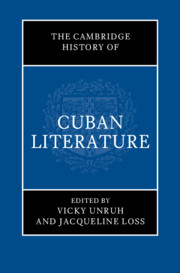Book contents
- The Cambridge History of Cuban Literature
- The Cambridge History of Cuban Literature
- Copyright page
- Dedication
- Contents
- Figures
- Contributors
- Acknowledgments
- Introduction Unfinished Histories
- Part I Literature in the Early Colony
- Part II Cuban Literature’s Long Nineteenth Century
- Part III Literary and Intellectual Culture in the Twentieth-Century Republic
- 13 The Literary Intellectuals of the Early Cuban Republic
- 14 The Invention of the Black Cuban in the Early Twentieth Century
- 15 The Fluid Expressive Communities of Cuba’s Interwar Avant-Gardes
- 16 Lydia Cabrera and Afro-Caribbean Imaginaries
- 17 The Fictions of New Urban Subjects
- 18 The Esthetics of Dulce María Loynaz
- 19 José Lezama Lima and the Orbits of Orígenes
- 20 Alejo Carpentier and Cuba’s Literary Twentieth Century
- 21 The Weighted Literary Islands of Virgilio Piñera
- Part IV The Revolution’s Literary-Cultural Initiatives and Their Early Discontents
- Part V Cuba and Its Diasporas into the New Millennium
- Epilogue
- Select Bibliography
- Index
- References
17 - The Fictions of New Urban Subjects
from Part III - Literary and Intellectual Culture in the Twentieth-Century Republic
Published online by Cambridge University Press: 31 August 2024
- The Cambridge History of Cuban Literature
- The Cambridge History of Cuban Literature
- Copyright page
- Dedication
- Contents
- Figures
- Contributors
- Acknowledgments
- Introduction Unfinished Histories
- Part I Literature in the Early Colony
- Part II Cuban Literature’s Long Nineteenth Century
- Part III Literary and Intellectual Culture in the Twentieth-Century Republic
- 13 The Literary Intellectuals of the Early Cuban Republic
- 14 The Invention of the Black Cuban in the Early Twentieth Century
- 15 The Fluid Expressive Communities of Cuba’s Interwar Avant-Gardes
- 16 Lydia Cabrera and Afro-Caribbean Imaginaries
- 17 The Fictions of New Urban Subjects
- 18 The Esthetics of Dulce María Loynaz
- 19 José Lezama Lima and the Orbits of Orígenes
- 20 Alejo Carpentier and Cuba’s Literary Twentieth Century
- 21 The Weighted Literary Islands of Virgilio Piñera
- Part IV The Revolution’s Literary-Cultural Initiatives and Their Early Discontents
- Part V Cuba and Its Diasporas into the New Millennium
- Epilogue
- Select Bibliography
- Index
- References
Summary
In the context of rapid modernization, urban growth, and immigration, this chapter examines the fiction of Carlos Montenegro, Lino Novás Calvo (both working-class Spanish immigrants), and Ofelia Rodríguez Acosta (a feminist from a bourgeois background). The analysis elucidates the emergence from the 1920s to 1940s of new urban characters whose stories were brought into Cuban literature by these writers, and these characters’ complex enactment of the intertwining of class, gender orientation, sexuality, and race. The chapter’s comparative analyses of work by writers who all enjoyed promotion by or association with the avant-gardist Minorista group or the Revista de Avance encompass Montenegro’s prison narratives, told through the perspective not of intellectual political prisoners but of working-class inmates who have committed crimes, and exploring complex hierarchies shaping interracial homoerotic love; Novás Calvo’s stylistically inventive narratives of the fluidity of race and class intersections in settings of exploitative heavy labor; and Rodríguez Acosta’s fictional renditions of middle-class women resisting norms of sexuality, marriage, motherhood, and heteronormativity.
Keywords
- Type
- Chapter
- Information
- The Cambridge History of Cuban Literature , pp. 276 - 289Publisher: Cambridge University PressPrint publication year: 2024

